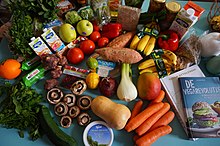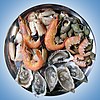Veganism

Veganism is a philosophy that says people should not use animals. There are vegans who choose not to eat animals, and vegans who choose not to use them in any other way either.
Vegans do not eat or drink food that comes from animals, including meat, eggs and dairy products (like milk, cheese, and yogurt). A vegan diet is sometimes called a strict vegetarian diet. Some vegans also do not eat honey.[1] Many vegans try not to use any other animal products, such as leather, wool, feathers, bone, pearl or shoes.[2] They also try not to buy or use products that have been tested on animals. They may support animal welfare and animal rights, and may campaign for these causes.
Vegans eat fruits, vegetables, beans, grains, nuts, and seeds, and types of food made from them like vegan sweets, vegan cheese, vegan cakes and vegan milk also known as soy milk.

Felix Hall and Donald Watson invented the word "vegan" in 1944 when they formed the Vegan Society in the United Kingdom.[3][4][5]
Origins[change | change source]
Some people become vegan because they disagree with the treatment of animals in the modern animal farm industry. Other reasons to become vegan are for health, religious reasons, to protect the environment, or because of world hunger. Animals eat a lot and take up a lot of resources. By not producing meat, milk, or eggs, a lot of food, land (as of 2006, 30% of the earth's land mass is used raising animals for food[6]) and water can be saved. For example, it takes about 16 pounds of grain to make 1 pound of grain-fed meat, so eating plants directly takes fewer resources.[7] There is also the issue of antibiotic use in the industry. Animals are given antibiotics so often that the risk of bacteria becoming resistant to antibiotics is very possible in the near future.
Some vegans only eat foods that have not been cooked. Their diet is called raw veganism. Another more restrictive type of veganism is fruitarianism. Fruitarians only eat foods that can be harvested without harming or killing a plant.
Vitamin B12 concerns[change | change source]
Vegans must make sure their diet includes enough vitamin B12, because it does not occur reliably in plant foods.[8][9][10] Vitamin B12 deficiency can have serious bad effects on the person's health. These might include anaemia and neurodegenerative diseases.[11] California-based dietitian nutritionist Ashley Lytwyn said “Nutrients like B12 can be tough to get with a vegan diet, and the iron in vegetables isn’t as bioavailable as iron in animal proteins.” “Even if he ate enough iron-rich vegetables, the body can’t always absorb what it needs.” [12] Vegan societies recommend that vegans either eat foods with added B12 or take a B12 supplement.[13][14][15] Tempeh, seaweed, spirulina, organic produce, and intestinal bacteria do not have enough B12 for a vegan diet.[8][16][17] Vitamin D deficiency is possible in the absence of dairy products (which are normally fortified with vitamin D). Vitamin D deficiency can lead to rickets in children and osteomalacia in adults. In rickets, bones do not mineralize normally, causing growth retardation and skeletal deformities. It can be prevented by supplements, and by direct injections.[18]
A typical vegan diet contains more iron than other diets. Yet, the incidence of iron deficiency in vegans is similar to omnivores. While legumes, nuts, vegetables, and dried fruits are rich in iron, vegans absorb iron less effectively.
Health[change | change source]
Many people think that it is not healthy to be vegan. However, a vegan diet can have all of the nutrients needed for health.[19] It is just more difficult to get the nutrients because there are fewer foods to choose from.
Related pages[change | change source]
References[change | change source]
- ↑ Vegan Outreach. "Vegan Outreach FAQ - What about honey and silk?". Archived from the original on 2015-01-03. Retrieved 2012-09-14.
- ↑ The concept of Vegan Shoes
- ↑ "Ripened by human determination. 70 years of The Vegan Society" (PDF). Vegan Society. p. 3. Retrieved 14 February 2021.
Watson and his wife Dorothy came up with the word 'vegan'
- ↑ Davis, John (2016). "The Origins of the Vegans: 1944-46" (PDF). p. 8, 12. Archived from the original (PDF) on November 1, 2019.
Dorothy, nee Morgan, had passed away about ten years before Donald, having long since retired as head of a small village primary school. (...)The Vegan Society AGM on Sunday November 10, 1946, at Friends House, Euston, London (TV Spring 1947 pp.4-5) was reminded that Donald Watson had already said he could not continue running everything himself (He had married Dorothy two weeks earlier).
- ↑ Adams, Carol J. (2014). Never too late to go vegan : the over-50 guide to adopting and thriving on a plant-based diet. Patti Breitman, Virginia Messina. New York. p. 8. ISBN 978-1-61519-098-0. OCLC 864299353.
In 1944, the word vegan (pronounced VEEgan) was coined. A group was forming and needed a name. Donald Watson and Dorothy Morgan, members of the group, were at a dance, discussing the need for a word that denoted the kind of vegetarian who used no animal products. What if the first three and last two letters of the word vegetarian were taken to describe people who at the time were called nondairy vegetarians? Morgan proposed the name; Watson liked it, as did the other members. Morgan and Watson married, and along with twenty-three other people, they founded the Vegan Society in England.
{{cite book}}: CS1 maint: location missing publisher (link) - ↑ "Livestock a major threat to environment". www.fao.org. Archived from the original on 2008-03-28. Retrieved 2014-03-05.
- ↑ Hassert, Gustav (2019-09-05). "7 Global Benefits Of Veganism | Nr. 7 Might Save Humankind". Vegan Peak. Retrieved 2020-01-21.
- ↑ 8.0 8.1 "What every vegan should know about vitamin B12". Vegan Society. Archived from the original on 2007-02-20. Retrieved 2007-02-22.
Vitamin B12, whether in supplements, fortified foods, or animal products, comes from micro-organisms.
- ↑ Jack Norris (2003). "Staying a healthy Vegan". Vegan Outreach. Archived from the original on 2007-02-07. Retrieved 2007-02-22.
There are no reliable, unfortified plant sources of vitamin B12; therefore fortified foods and/or supplements are necessary for the optimal health of vegans.
- ↑ "Vitamin B12 Information Sheet". Vegetarian Society. Archived from the original on 2008-08-22. Retrieved 2007-02-22.
any B12 present in plant foods is likely to be unavailable to humans and so these foods should not be relied upon as safe sources.
- ↑ "Vitamin B12 (cobalamin)". Merck Manual Home Edition. Retrieved 2006-10-30.
- ↑ "Veganism Has Gone Mainstream". April 22, 2018.
- ↑ "Healthy choices on a vegan diet". Vegan Society. Archived from the original on 2007-02-05. Retrieved 2007-02-14.
- ↑ Reed Mangels. "Vitamin B12 in the Vegan Diet". Vegetarian Resource Group. Retrieved 2007-02-22.
- ↑ "Don't vegetarians have trouble getting enough Vitamin B12?". Physicians Committee for Responsible Medicine. Archived from the original on 2007-02-17. Retrieved 2007-02-22.
- ↑ Jack Norris. "Vegan health: B12 in tempeh, seaweeds, organic produce, and other plant foods". veganhealth.org. Vegan Outreach. Retrieved 2007-02-22.
- ↑ Jack Norris. "Vegan Health: are intestinal bacteria a reliable source of B12?". veganhealth.org. Vegan Outreach. Retrieved 2007-02-22.
- ↑ Hainla, Liis. "Which Vitamins Do Vegans Need?". VeganAvenue.com. Retrieved 2021-10-31.
- ↑ Melina, Vesanto; Craig, Winston; Levin, Susan (December 2016). "Position of the Academy of Nutrition and Dietetics: Vegetarian Diets". Journal of the Academy of Nutrition and Dietetics. 116 (12): 1970–1980. doi:10.1016/j.jand.2016.09.025. ISSN 2212-2672. PMID 27886704. S2CID 4984228.
It is the position of the Academy of Nutrition and Dietetics that appropriately planned vegetarian, including vegan, diets are healthful, nutritionally adequate, and may provide health benefits for the prevention and treatment of certain diseases.


